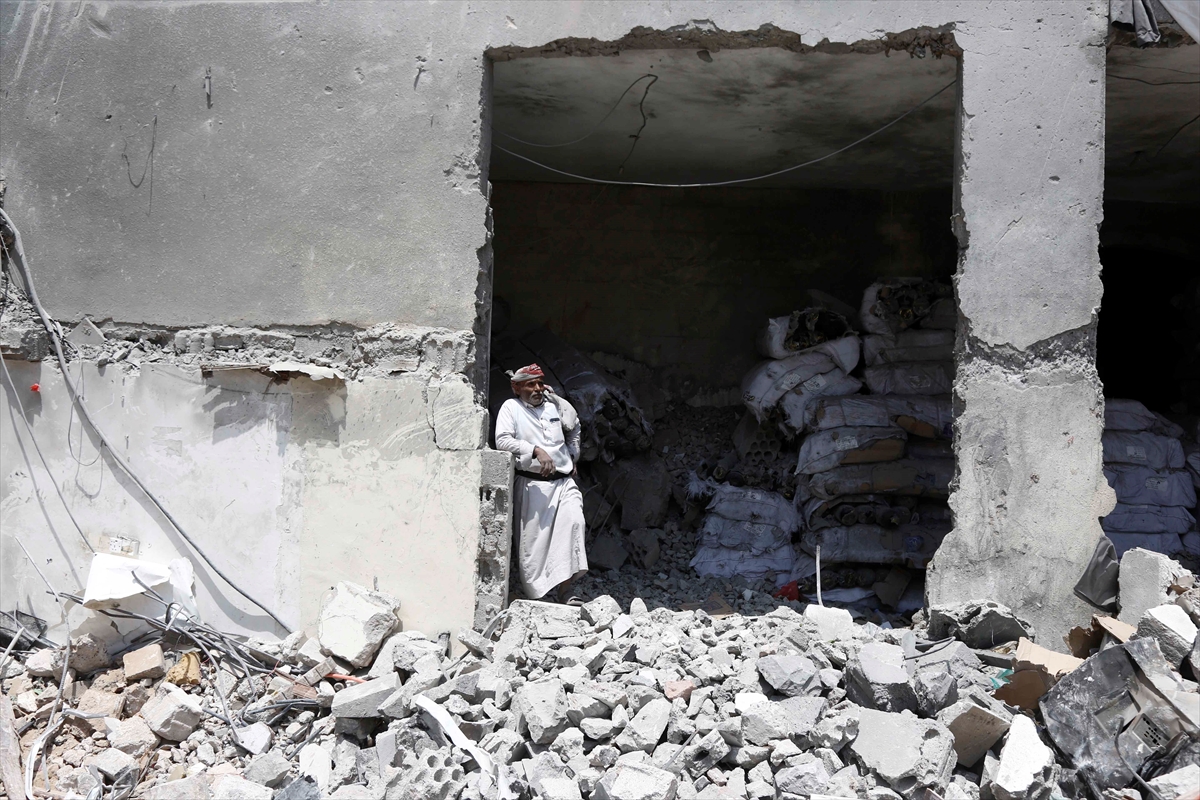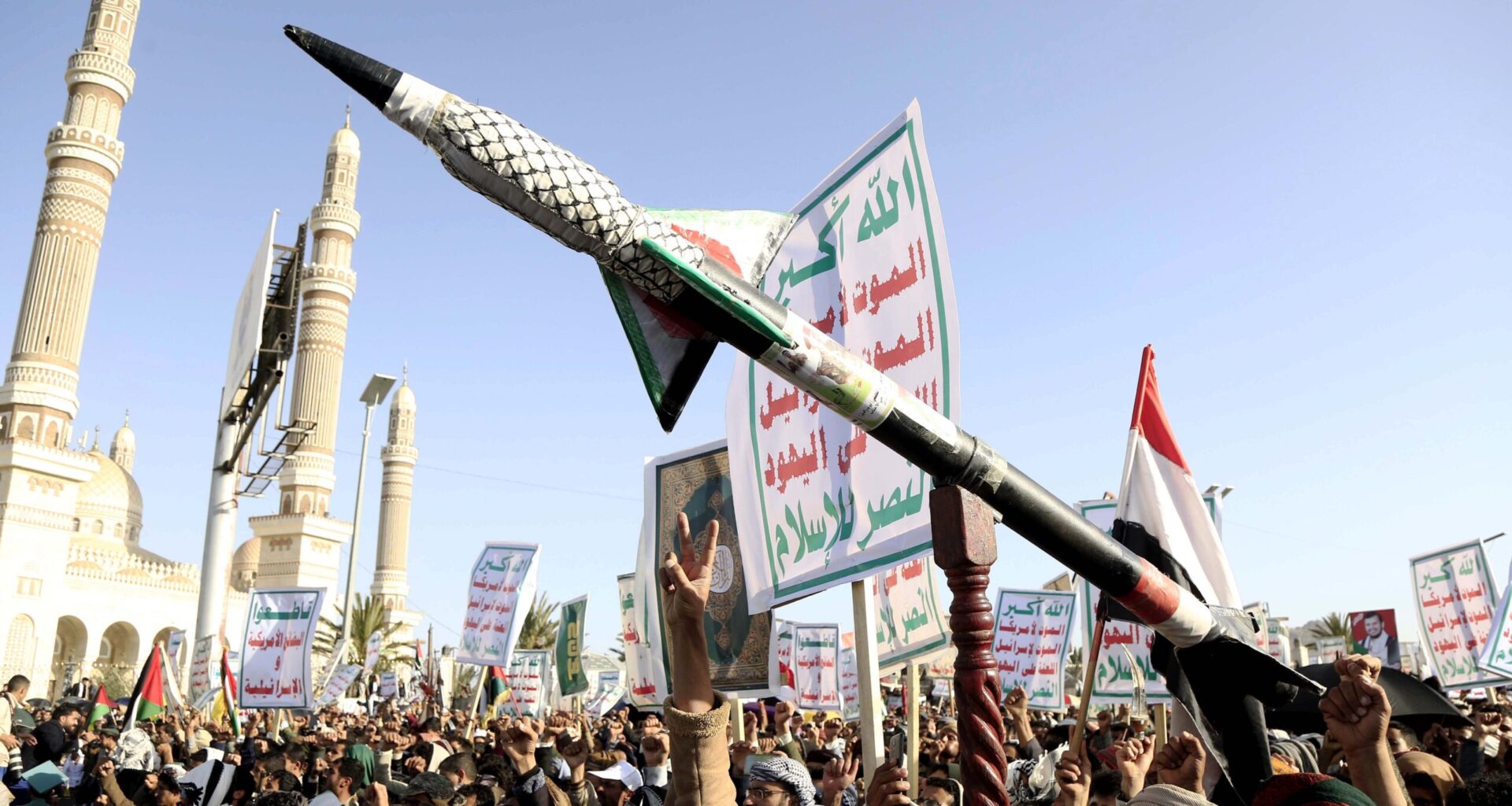 SANAA, YEMEN – DECEMBER 20: Thousands of Houthi supporters, holding banners and Palestinian flags, gather in Al-Sabeen Square to demonstrate in support of Palestinian people and protest against Israel’s ongoing attacks on Gaza, on December 20, 2024, in Sanaa, Yemen. ( Mohammed Hamoud – Anadolu Agency )
SANAA, YEMEN – DECEMBER 20: Thousands of Houthi supporters, holding banners and Palestinian flags, gather in Al-Sabeen Square to demonstrate in support of Palestinian people and protest against Israel’s ongoing attacks on Gaza, on December 20, 2024, in Sanaa, Yemen. ( Mohammed Hamoud – Anadolu Agency )
UN Chief António Guterres has slammed the spiralling violence between Israel and Yemen’s Houthi AnsarAllah rebels, sounding dire alarms over the catastrophic civilian tolls and a looming regional meltdown.
The United Nations leader expressed his alarm through a statement issued on Saturday, as violence between the two sides intensified over the past week.
His spokesman Stephane Dujarric said Guterres “reminds all parties of their obligations to ensure that civilians are respected and protected at all times, in accordance with international law.”
The UN chief, according to Dujarric, remains “deeply troubled” by the trajectory of events and has urged both sides to exercise the “utmost restraint.”
The remarks followed a new wave of attacks which brought the confrontation between Israel and Yemen to international attention once again.
Yemen’s Houthi-backed forces struck the Israeli city of Eilat with a drone, an assault that reportedly left 20 people injured and a least 2 in serious condition. The attack highlighted the ability of the Yemen to project force far beyond its borders, targeting areas deep inside Israel and vital shipping in the Red Sea.
In response, Israel launched a series of airstrikes on Yemen’s capital Sanaa. The strikes reportedly resulted in the deaths of at least nine people, including children, and left more than 150 others wounded.
Sign up for regular updates straight to your inbox
Subscribe to our newsletter and stay updated on the latest news and updates from around the Muslim world!
 SANAA, YEMEN – SEPTEMBER 26: A man stands among the rubble after an Israeli airstrike hit Sanaa. (Mohammed Hamoud, AA)
SANAA, YEMEN – SEPTEMBER 26: A man stands among the rubble after an Israeli airstrike hit Sanaa. (Mohammed Hamoud, AA)
Images of the aftermath from Sanaa underscored the heavy civilian toll, which has become an increasing concern for international observers.
The UN Secretary-General emphasised that such actions, on both sides, risk setting off a wider conflagration at a time when the Middle East is already experiencing severe instability.
The cycle of strikes and counterstrikes marks a continuation of hostilities that have been building for months.
The Houthis, an armed political group which seized power in Yemen in 2018, and Israel have exchanged attacks on several occasions in recent times, with each round intensifying anxieties about the direction of the conflict.
Israel’s attacks on Yemen have caused significant death and destruction. Thirty one journalists and media staff were killed by Israeli strikes on newspaper offices in Yemen in mid-September, an attack the Committee to Protect Journalists (CPJ) said was the deadliest attack on journalists in the last 16 years.
Another deadly Israeli attack on Sanaa in August managed to take out senior Yemeni political leaders including the Prime Minister Ahmed Ghaleb Nasser al-Rahawi.
However, Yemen’s Houthi-led forces have also managed to cause significant damage to world trade by attacking Israel-linked shipping in the Red Sed, while also firing projectiles deep into Israel, sparking panicked runs to bomb shelters which often result in injuries.
 Screenshot from a video released by the Houthis media centre on July 8, showing the Liberian-flagged vessel, the Magic Seas, being sunk following attacks off the coast of the port city of Hodeidah in Yemen.
Screenshot from a video released by the Houthis media centre on July 8, showing the Liberian-flagged vessel, the Magic Seas, being sunk following attacks off the coast of the port city of Hodeidah in Yemen.
Guterres’ warning reflects fears that these skirmishes could evolve into a larger and more dangerous war.
The spokesman’s statement noted that the Secretary-General’s concern is not limited to the latest casualties but also extends to the broader implications for regional peace.
By urging restraint, the UN is pressing for an immediate de-escalation, arguing that further violence will only multiply the suffering of civilians who are already bearing the brunt of war.
The backdrop to these developments remains the ongoing conflict in Gaza. Since October 2023, Israel’s war on the enclave has claimed the lives of nearly 66,000 Palestinians.
The staggering death toll has fuelled anger across the region and intensified anti-Israel sentiment among groups such as Yemen, who remain the only Arab country still militarily invested in fighting Israel until the genocide in Gaza stops.
The Gaza war has also drawn international criticism and raised persistent questions about compliance with humanitarian law.
For now, the UN Secretary-General’s words stand as both a condemnation of recent actions and a plea for moderation. Whether the parties involved heed that call remains uncertain, but the urgency of his message underscores the growing fear that the Middle East could be entering yet another cycle of devastating conflict.
Add your comments below


